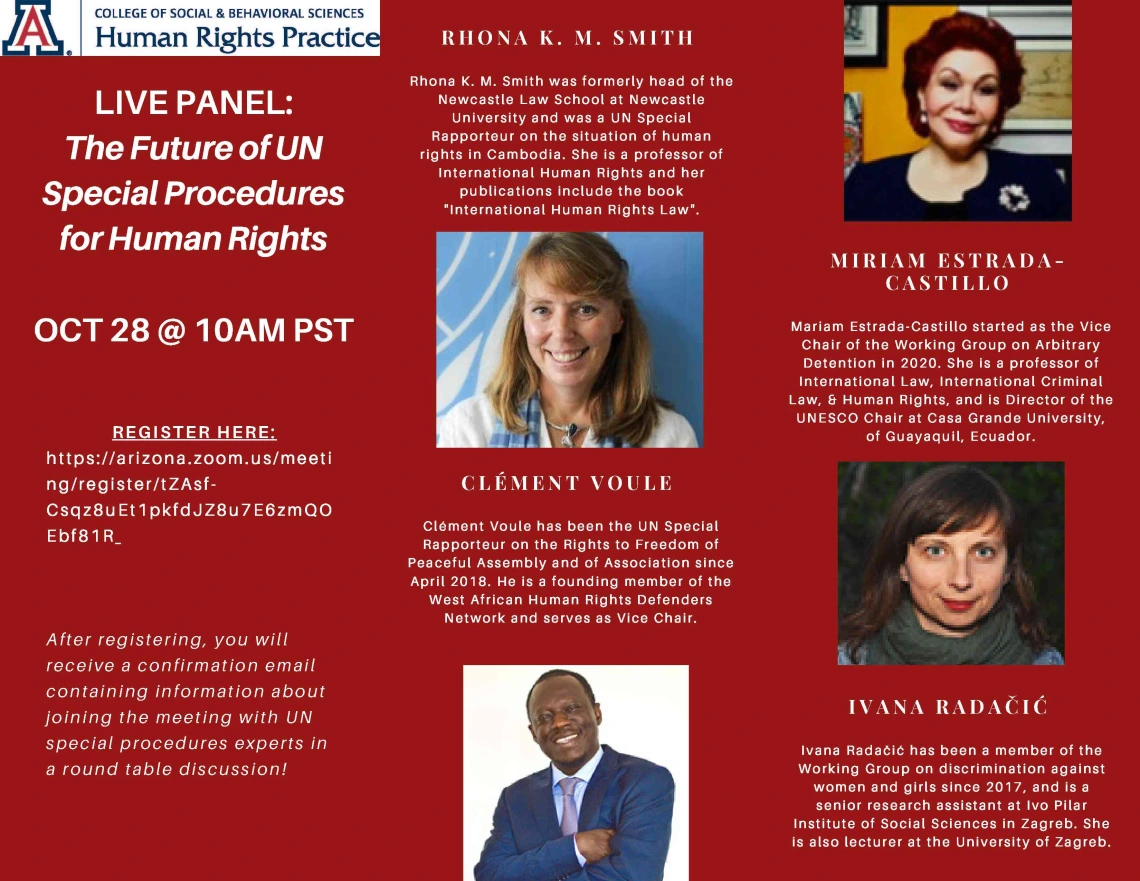Panel on "The Future of UN Special Procedures"

Although the term never appears in the United Nations Charter, UN Special Procedures have in recent decades emerged as major contributors in the pursuit of international human rights. UN Secretary-General Kofi Annan famously called them the "jewel in the crown" of the UN human rights system.
On October 28, 2021, the Human Rights Practice Program sponsored a webinar on “The Future of UN Special Procedures for Human Rights.” The panelists were: Rhona K.M. Smith, Former UN Special Rapporteur on Human Rights in Cambodia (and a co-organizer of the event); Clément Voule, UN Special Rapporteur on the Rights to Freedom of Peaceful Assembly and Association; Ivana Radačić, Member of the UN Working Group on Discrimination Against Women and Girls; and Dr. Miriam Estrada-Castillo, Vice-Chair of the UN Working Group on Arbitrary Detentions. The webinar was moderated by Human Rights Practice MA student McKenna Braaton, who helped to develop the event along with fellow Human Rights Practice students Mayra Aguilar and Aaron Taylor.
Special Procedures -- a term encompassing the work of UN Special Rapporteurs, Independent Experts, and Working Groups -- receive a mandate from the UN Human Rights Council to focus on a particular country or theme. The mandate holders are distinguished civil society experts who are not beholden to any government or branch of the UN. Many draw upon extensive experience from academia, NGOs, prior UN, or other work with other international or national bodies. Their work is not paid by the UN, although some find support from other institutions. For example, there is a Special Rapporteur on the Rights of Indigenous Peoples who is institutionally based at the University of Arizona College of Law.
At the webinar, the discussion was wide-ranging, underlining both the great latitude that Special Procedures have to operate but also the reality that they must function within the often-stilted structures and processes of the UN. Speakers noted that they take in information from an extraordinarily wide range of actors, including civil society, NGOs, official government sources, UN sources, grassroots activists, and impacted populations. This creates an imperative to act when mandate holders learn about human right being violated. Special Procedures "have to be impartial, but not neutral," said Voule, when it comes to documenting violations and defending victims.
Speakers also noted that while mandate holders are not sponsored by, and do not report to, individual states, they can potentially be subjected to pressure by governments, including those that they are investigating. Further, while they often are called upon to play a quasi-judicial role while investigating allegations against states, the mandate holders are not judges and they do not have the ability to enforce their decisions or interpretations of human rights law. Still, mandate holders also face pushback in the form of criticisms of the UN or of the weaknesses of the human rights system over which they have no direct influence. Nonetheless, the panel agreed that Special Procedures have a unique role to play moving forward: "we can get things done that others can't," stated Smith.
The formal reports of Special Procedures mandate holders, as well as their responses to individual communications, can provide rich analyses of the human rights violations of vulnerable groups. Importantly, Special Procedures have the flexibility to draw upon multiple sources of international human rights law in innovative ways.
"These UN Special Mechanisms are understudied and underutilized. And yet, they can be an important avenue for drawing attention to human rights abuses and they can serve as the voice of marginalized peoples facing repressive regimes," noted Prof. William Simmons, Director of the UArizona Program in Human Rights Practice.

